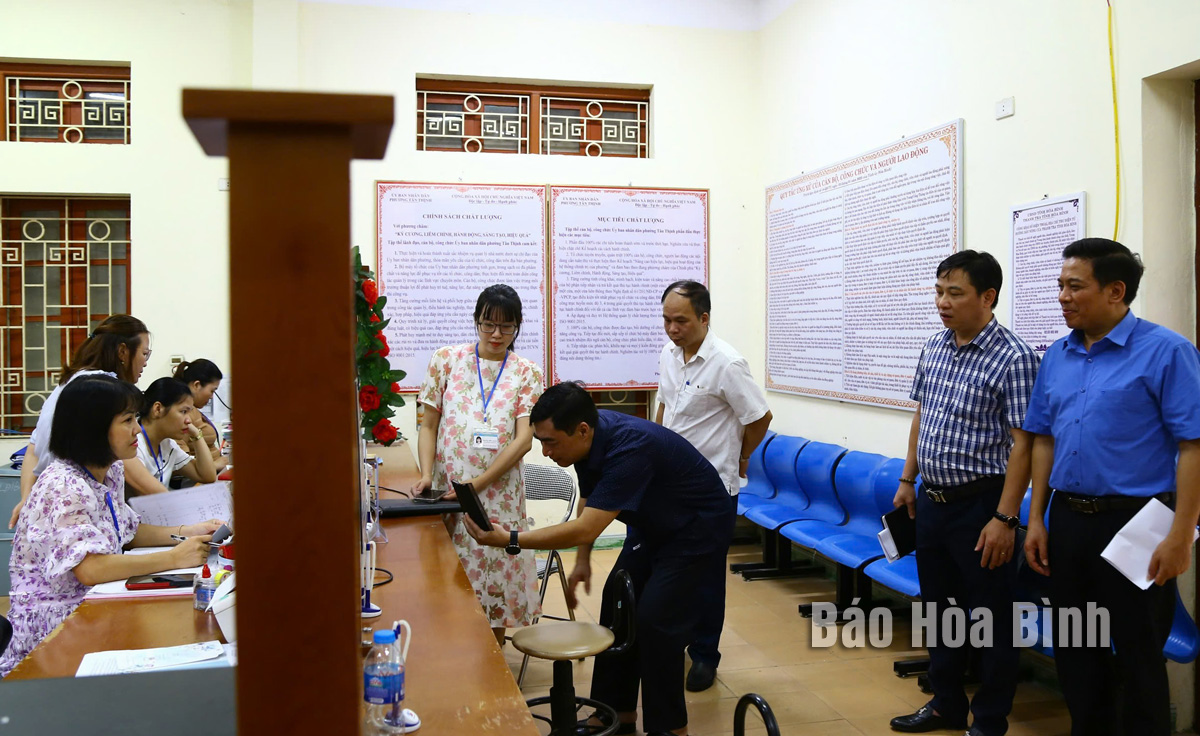
The "Friendly administration serving the people" model implemented across Hoa Binh province in recent times has been recognised and highly appreciated by local Party committees, authorities, officials, civil servants, and people, reflected through a large number of locals and businesses directly coming to transact and carry out administrative procedures at the provincial Public Administration Service Centre, and one-stop-shop units of the People's Committees of Hoa Binh city, districts, communes, wards and towns.
A working group of the Emulation and Rewards Board (Department of Home Affairs) appraises the model "Applying QR Code to survey the satisfaction level of organisations and people with public administrative services at the one-stop-shop unit” at Tan Thinh ward People's Committee (Hoa Binh city).
The model is one of the "smart mass mobilisation” models that localities have focused on leading and directing the effective implementation.
The implementation of the model aims to strongly innovate the working style of the government from "administrative orders" to "serving, guiding, encouraging, persuading"; and building a style of "respecting the people, being close to the people, understanding the people, learning from the people and being responsible to the people", aiming at people's satisfaction with the management and administration of authorities at all levels.
As of June the whole province had had 137 out of the 151 communes, wards and towns implementing the model. Assessing its initial effectiveness, Nguyen Van Lam, deputy head of the provincial Party Committee's Mass Mobilisation Commission, said that after more than one year of implementation, the model has received the consensus, response and high appreciation of officials, party members and people, created a positive change in promoting the sense of responsibility to serve the people of the grassroots administration system, especially building the working style of "respecting the people, being close to the people, understanding the people, learning from the people, and being responsible to the people". The role, responsibility, and reputation of leaders of Party committees at all levels have been enhanced, gaining praises from local people.
In order for the model to continue to be carried out widely and effectively in the coming time, the steering boards of the "smart mass mobilisation” emulation movement at all levels, based on the plans and instructions of the provincial Steering Committee, should proactively provide advice for Party committees and authorities to continue paying close attention to leading and directing mass mobilisation work in general, and the implementation of the Friendly administration serving the people" model, considering this as one of the key tasks and important solutions to improve the effectiveness of leadership, direction, and implementation of local political tasks. It is expected that in 2024, the remaining communes, wards, and towns will launch the model as planned.
Hoa Binh province is undergoing a dynamic transformation amid Vietnam’s national digital transition. Building on Poliburo’s Resolution No. 57-NQ/TW on breakthroughs in science, technology, innovation, and national digital transformation, the province has rolled out a wide range of practical action plans. A standout initiative is the "Digital Literacy for All” movement, an effort to ensure that no one is left behind in the digital era.
Hoa Binh province is undergoing a dynamic transformation in the wake of the national digital transformation movement. Building on Resolution No. 57-NQ/TW of the Politburo on breakthroughs in science, technology, innovation, and national digital transformation, the province has implemented a wide range of practical action plans. A standout initiative is the "Digital Literacy for All” movement ambitious effort to ensure that no one is left behind in the digital age.
With a spirit of unity and proactive problem-solving, the Party Committee, the government and the people of Dong Lai Commune (Tan Lac District) have made great strides in implementing the resolutions of the 24th Party Congress of the commune for the 2020 - 2025 term. Focusing on leadership and practical actions, the commune has brought the Party’s resolutions into daily life, creating strong impacts and pushing the local development forward.
Amid the nationwide push for digital transformation, young people in Hoa Binh Province are stepping up as dynamic pioneers, applying technology to enhance Youth Union operations and expand the reach of youth-led initiatives. Through creativity and adaptability, Youth Union organizations at all levels have introduced a series of practical solutions, contributing to modern governance and community development.
In recent years, An Nghia commune, located in Lac Son district, has stepped up administrative reform, focusing on improving the quality and efficiency of its single-window service unit for receiving and processing administrative procedures. These improvements have helped create favourable conditions for local residents and organisations to handle administrative procedures, contributing to the commune’s broader socio-economic development.
The Prime Minister-approved master plan to develop the multi-use value of forests ecosystems through 2030, with a vision to 2050, aims to improve the management and sustainable use of forest resources, create jobs, increase incomes, and improve the living standards of ethnic minorities, people in mountainous and remote areas, forest workers and those living near forests.



